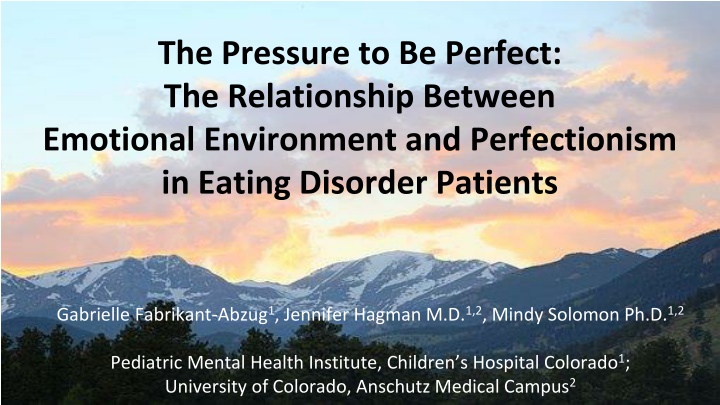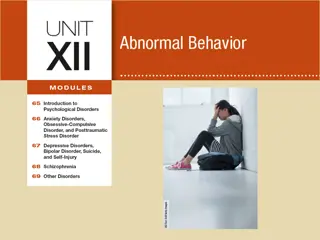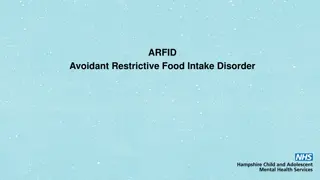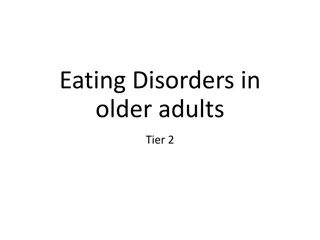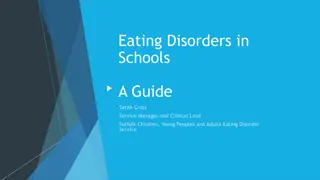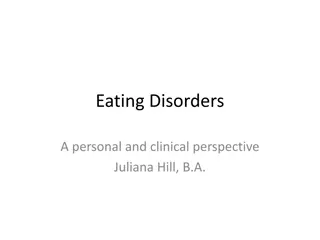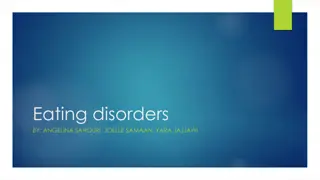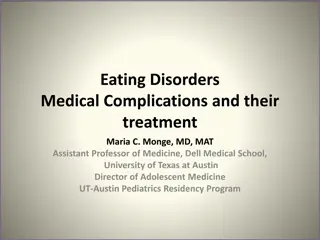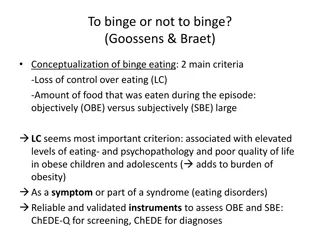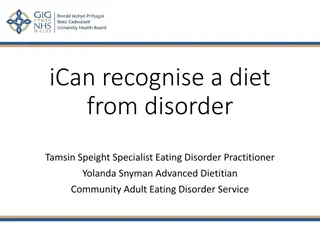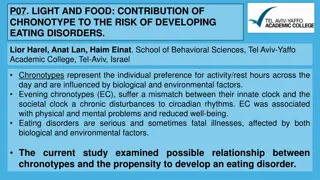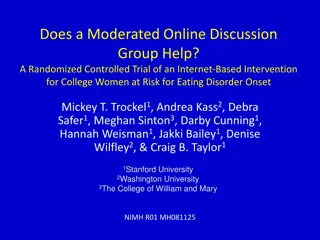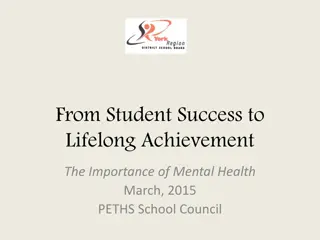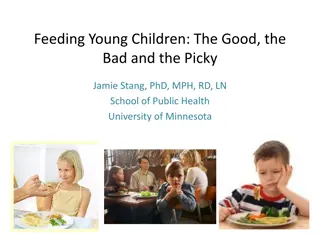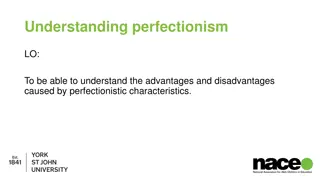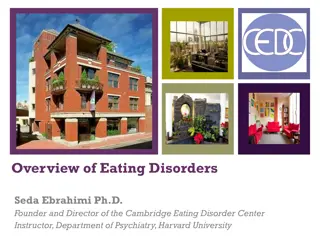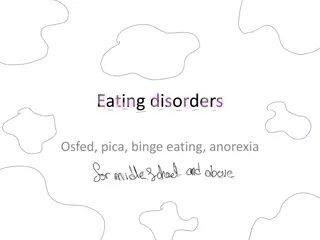Relationship Between Emotional Environment and Perfectionism in Eating Disorder Patients
Eating disorders are a growing concern, with family emotional environment playing a pivotal role in their development. This study delves into the impact of criticism and perfectionism on individuals with eating disorders, shedding light on the correlation between emotional environment within families and levels of perfectionism in patients, particularly those with Anorexia Nervosa. Through an analysis of data collected from children and their parents, the study aims to uncover the intricacies of this relationship and its implications for understanding and treating eating disorders.
Download Presentation

Please find below an Image/Link to download the presentation.
The content on the website is provided AS IS for your information and personal use only. It may not be sold, licensed, or shared on other websites without obtaining consent from the author.If you encounter any issues during the download, it is possible that the publisher has removed the file from their server.
You are allowed to download the files provided on this website for personal or commercial use, subject to the condition that they are used lawfully. All files are the property of their respective owners.
The content on the website is provided AS IS for your information and personal use only. It may not be sold, licensed, or shared on other websites without obtaining consent from the author.
E N D
Presentation Transcript
The Pressure to Be Perfect: The Relationship Between Emotional Environment and Perfectionism in Eating Disorder Patients Gabrielle Fabrikant-Abzug1, Jennifer Hagman M.D.1,2, Mindy Solomon Ph.D.1,2 Pediatric Mental Health Institute, Children s Hospital Colorado1; University of Colorado, Anschutz Medical Campus2
Thin Is In! Eating disorders (ED) are becoming an increasingly prevalent issue in today s society Emotional environment within the family has been shown to be one of the most important risk factors that leads to developing an ED1 Criticism
Pressure to Be Perfect High levels of perfectionism have also been associated with development of an ED2 Few studies have explored the relationship between emotional environment and the child s level of perfectionism
Purpose and Hypothesis To determine if there is a relationship between emotional environment of the family (measured by criticism) and level of perfectionism within the patient
Study Population 213 children 142 mothers 65 fathers
Data Collection Instruments Questions on the admissions surveys include: The Eating Disorder Inventory, which is a valid, reliable and widely used device that evaluates and scores symptoms associated with eating disorders, including perfectionism I feel that I must do things perfectly or not at all I hate being less than best at things Questions relating to aspects of emotional environment
Data Collection Instruments Question Children Received (Perceived Criticism): Question Parents Received (Reported Criticism):
A significant relationship was found between the childs perceived criticism from the mother and perfectionism scores among those who have Anorexia Nervosa
A positive trend near significance was found between the childs perceived criticism from the father and perfectionism scores among those with Bulimia Nervosa
Key Findings Level of criticism from different family members may influence the way ED symptoms present in children who are already predisposed to ED The relationship between criticism and perfectionism was different depending on which parent and ED diagnosis being evaluated
Limitations to the Study Perfectionism and criticism were measured by self report Diagnoses were made through an unstructured clinical interview Subjects were limited to families seeking treatment in higher levels of care at the PMHI in Denver, Colorado (i.e. patients with more severe symptoms)
Future Directions These results suggest that family dynamics and perfectionistic tendencies may influence the development of EDs Family involvement in treatment may lead to greater success, which is consistent with previous research Other risk factors should be further studied
References 1. Gon alves, J., Moreira, E., Trindade, E., & Fiates, G. (n.d.). Eating disorders in childhood and adolescence. Revista Paulista De Pediatria : Org o Oficial Da Sociedade De Pediatria De S o Paulo.,31(1), 96-103. Bardone-Cone, Anna M., Stacy L. Lin, and Rachel M. Butler. "Perfectionism and Contingent Self-Worth in Relation to Disordered Eating and Anxiety." Behavior Therapy, vol. 48, no. 3, 2016;2017;, pp. 380. Sassaroli, S., et al. "Perfectionism as a Mediator between Perceived Criticism and Eating Disorders." Eating and Weight Disorders - Studies on Anorexia, Bulimia and Obesity, vol. 16, no. 1, 2011, pp. 37-44. 2. 3.
Thank you to... Program sponsors for their generosity in allocating the funds to support the program: Dr. Dominique Martinez (CCTSI Office of Diversity and Inclusion) Dr. Douglas Novins, and Dr. Jennifer Hagman (PMHI) Mentors at EDU for all their help: Dr. Mindy Solomon, Dr. Jennifer Hagman, and Dr. Helene Simons Program mentors for their organization and constant support:
